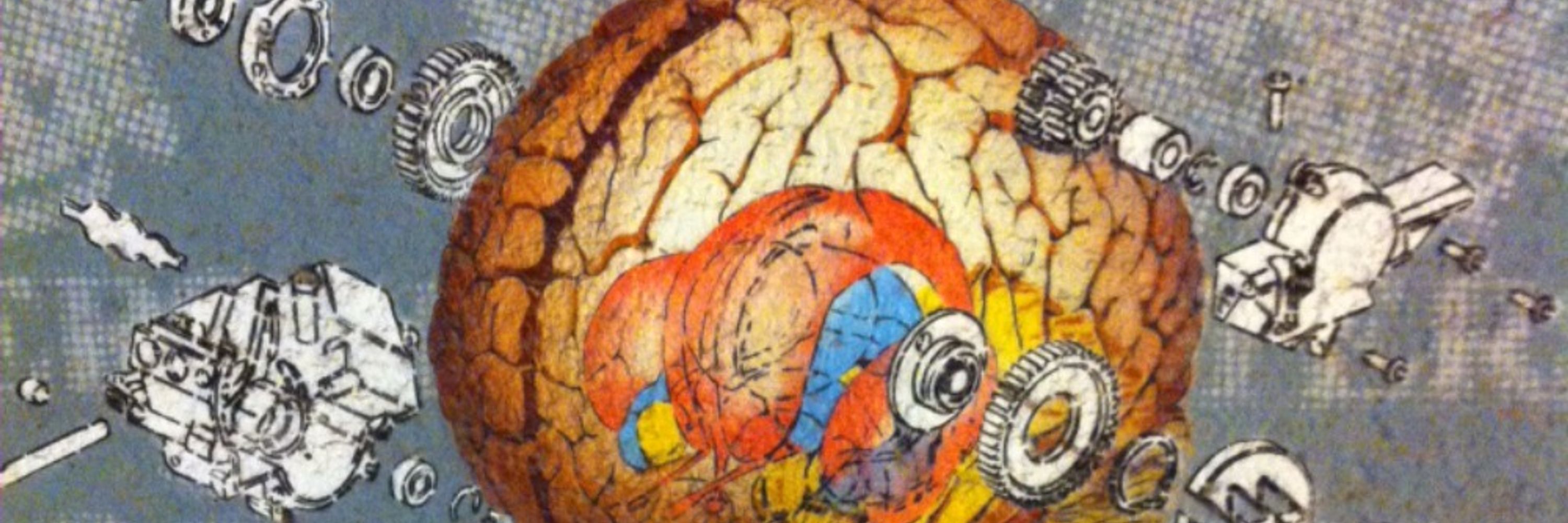
Martin Zettersten
@mzettersten.bsky.social
Asst Prof UCSD Cognitive Science
language development | cognitive development | learning
https://mzettersten.github.io/
(he/his)
language development | cognitive development | learning
https://mzettersten.github.io/
(he/his)
Reposted by Martin Zettersten
lots of invigorating discussion this year at #BUCLD2025. Unsurprisingly, LLMs as models & as tools made many appearances w/a wide range of views/claims/caveats ab what they can(not) tell us ab language development
I'm still chewing on a few things that seemed to get short shrift 1/4 🐦🐦
I'm still chewing on a few things that seemed to get short shrift 1/4 🐦🐦
November 10, 2025 at 4:30 PM
lots of invigorating discussion this year at #BUCLD2025. Unsurprisingly, LLMs as models & as tools made many appearances w/a wide range of views/claims/caveats ab what they can(not) tell us ab language development
I'm still chewing on a few things that seemed to get short shrift 1/4 🐦🐦
I'm still chewing on a few things that seemed to get short shrift 1/4 🐦🐦
Reposted by Martin Zettersten
#BUCLD50 Symposium: “Innateness is not a dirty word: Reframing the origins of language development”, by Shanley Allen, Marisa Casillas, Alejandrina Cristia, Michael C. Frank, Caroline Rowland, Leher Singh, and Paul Bloom!
Learn more at:
www.bu.edu/bucld/
#Innateness #LLM #LanguageDevelopment
Learn more at:
www.bu.edu/bucld/
#Innateness #LLM #LanguageDevelopment

October 19, 2025 at 9:25 PM
#BUCLD50 Symposium: “Innateness is not a dirty word: Reframing the origins of language development”, by Shanley Allen, Marisa Casillas, Alejandrina Cristia, Michael C. Frank, Caroline Rowland, Leher Singh, and Paul Bloom!
Learn more at:
www.bu.edu/bucld/
#Innateness #LLM #LanguageDevelopment
Learn more at:
www.bu.edu/bucld/
#Innateness #LLM #LanguageDevelopment
Reposted by Martin Zettersten
Recruiting PhD students for Fall 2026!
The Coupled Minds Lab at @tamu.bsky.social will use a multimodal approach combining fMRI hyperscanning, computational modeling, and natural language processing to study how conversations transform minds. Learn more: coupled-minds.github.io
Due Date Dec 1
The Coupled Minds Lab at @tamu.bsky.social will use a multimodal approach combining fMRI hyperscanning, computational modeling, and natural language processing to study how conversations transform minds. Learn more: coupled-minds.github.io
Due Date Dec 1
Coupled Minds Lab
Coupled Minds Lab — social neuroscience of conversation, negotiation, and human–AI interaction.
coupled-minds.github.io
October 20, 2025 at 12:40 AM
Recruiting PhD students for Fall 2026!
The Coupled Minds Lab at @tamu.bsky.social will use a multimodal approach combining fMRI hyperscanning, computational modeling, and natural language processing to study how conversations transform minds. Learn more: coupled-minds.github.io
Due Date Dec 1
The Coupled Minds Lab at @tamu.bsky.social will use a multimodal approach combining fMRI hyperscanning, computational modeling, and natural language processing to study how conversations transform minds. Learn more: coupled-minds.github.io
Due Date Dec 1
Reposted by Martin Zettersten
𝐃𝐨 𝐲𝐨𝐮 𝐫𝐞𝐚𝐥𝐥𝐲 𝐰𝐚𝐧𝐭 𝐭𝐨 𝐬𝐞𝐞 𝐰𝐡𝐚𝐭 𝐦𝐮𝐥𝐭𝐢𝐥𝐢𝐧𝐠𝐮𝐚𝐥 𝐞𝐟𝐟𝐨𝐫𝐭 𝐥𝐨𝐨𝐤𝐬 𝐥𝐢𝐤𝐞? 🇨🇳🇮🇩🇸🇪
Here’s the proof! 𝐁𝐚𝐛𝐲𝐁𝐚𝐛𝐞𝐥𝐋𝐌 is the first Multilingual Benchmark of Developmentally Plausible Training Data available for 45 languages to the NLP community 🎉
arxiv.org/abs/2510.10159
Here’s the proof! 𝐁𝐚𝐛𝐲𝐁𝐚𝐛𝐞𝐥𝐋𝐌 is the first Multilingual Benchmark of Developmentally Plausible Training Data available for 45 languages to the NLP community 🎉
arxiv.org/abs/2510.10159

October 14, 2025 at 5:01 PM
𝐃𝐨 𝐲𝐨𝐮 𝐫𝐞𝐚𝐥𝐥𝐲 𝐰𝐚𝐧𝐭 𝐭𝐨 𝐬𝐞𝐞 𝐰𝐡𝐚𝐭 𝐦𝐮𝐥𝐭𝐢𝐥𝐢𝐧𝐠𝐮𝐚𝐥 𝐞𝐟𝐟𝐨𝐫𝐭 𝐥𝐨𝐨𝐤𝐬 𝐥𝐢𝐤𝐞? 🇨🇳🇮🇩🇸🇪
Here’s the proof! 𝐁𝐚𝐛𝐲𝐁𝐚𝐛𝐞𝐥𝐋𝐌 is the first Multilingual Benchmark of Developmentally Plausible Training Data available for 45 languages to the NLP community 🎉
arxiv.org/abs/2510.10159
Here’s the proof! 𝐁𝐚𝐛𝐲𝐁𝐚𝐛𝐞𝐥𝐋𝐌 is the first Multilingual Benchmark of Developmentally Plausible Training Data available for 45 languages to the NLP community 🎉
arxiv.org/abs/2510.10159
Reposted by Martin Zettersten
🐦 Exciting news! Our new paper is out in PLOS Biology:
“A large-scale study across the avian clade identifies ecological drivers of neophobia.”
Led by the #ManyBirds Project - 129 researchers, 82 institutions, 24 countries 🌍
🔗 journals.plos.org/plosbiology/...
@themanybirds.bsky.social
“A large-scale study across the avian clade identifies ecological drivers of neophobia.”
Led by the #ManyBirds Project - 129 researchers, 82 institutions, 24 countries 🌍
🔗 journals.plos.org/plosbiology/...
@themanybirds.bsky.social

A large-scale study across the avian clade identifies ecological drivers of neophobia
Neophobia (the aversive response to novelty) varies considerably across species and individuals, and can impact adaptability and survival. This study assesses neophobia in 1400 subjects from 136 bird ...
journals.plos.org
October 14, 2025 at 6:45 PM
🐦 Exciting news! Our new paper is out in PLOS Biology:
“A large-scale study across the avian clade identifies ecological drivers of neophobia.”
Led by the #ManyBirds Project - 129 researchers, 82 institutions, 24 countries 🌍
🔗 journals.plos.org/plosbiology/...
@themanybirds.bsky.social
“A large-scale study across the avian clade identifies ecological drivers of neophobia.”
Led by the #ManyBirds Project - 129 researchers, 82 institutions, 24 countries 🌍
🔗 journals.plos.org/plosbiology/...
@themanybirds.bsky.social
Reposted by Martin Zettersten
Ever wonder how habituation works? Here's our attempt to understand:
A stimulus-computable rational model of visual habituation in infants and adults doi.org/10.7554/eLif...
This is the thesis of two wonderful students: @anjiecao.bsky.social @galraz.bsky.social, w/ @rebeccasaxe.bsky.social
A stimulus-computable rational model of visual habituation in infants and adults doi.org/10.7554/eLif...
This is the thesis of two wonderful students: @anjiecao.bsky.social @galraz.bsky.social, w/ @rebeccasaxe.bsky.social




September 29, 2025 at 11:38 PM
Ever wonder how habituation works? Here's our attempt to understand:
A stimulus-computable rational model of visual habituation in infants and adults doi.org/10.7554/eLif...
This is the thesis of two wonderful students: @anjiecao.bsky.social @galraz.bsky.social, w/ @rebeccasaxe.bsky.social
A stimulus-computable rational model of visual habituation in infants and adults doi.org/10.7554/eLif...
This is the thesis of two wonderful students: @anjiecao.bsky.social @galraz.bsky.social, w/ @rebeccasaxe.bsky.social
Reposted by Martin Zettersten
Seems like a particularly cruel change to make without warning given the stress that reviewers often put on applicants' publication record. Presumably many strong students waited based on this apparent criterion, not because they didn't already have great ideas to propose.
Extremely disappointing decision from the NSF today to exclude second-year graduate students from eligibility for the GRFP. I and many other second-year grads purposely held off from applying in our first year to be able to do so now...
September 26, 2025 at 5:48 PM
Seems like a particularly cruel change to make without warning given the stress that reviewers often put on applicants' publication record. Presumably many strong students waited based on this apparent criterion, not because they didn't already have great ideas to propose.
Reposted by Martin Zettersten
New paper: We argue that linearization in language production is a foraging process, with speakers navigating semantic and spatial clusters. Lead author: Karina Tachihara, former UC Davis postdoc, now faculty at UIUC!
www.sciencedirect.com/science/arti...
www.sciencedirect.com/science/arti...
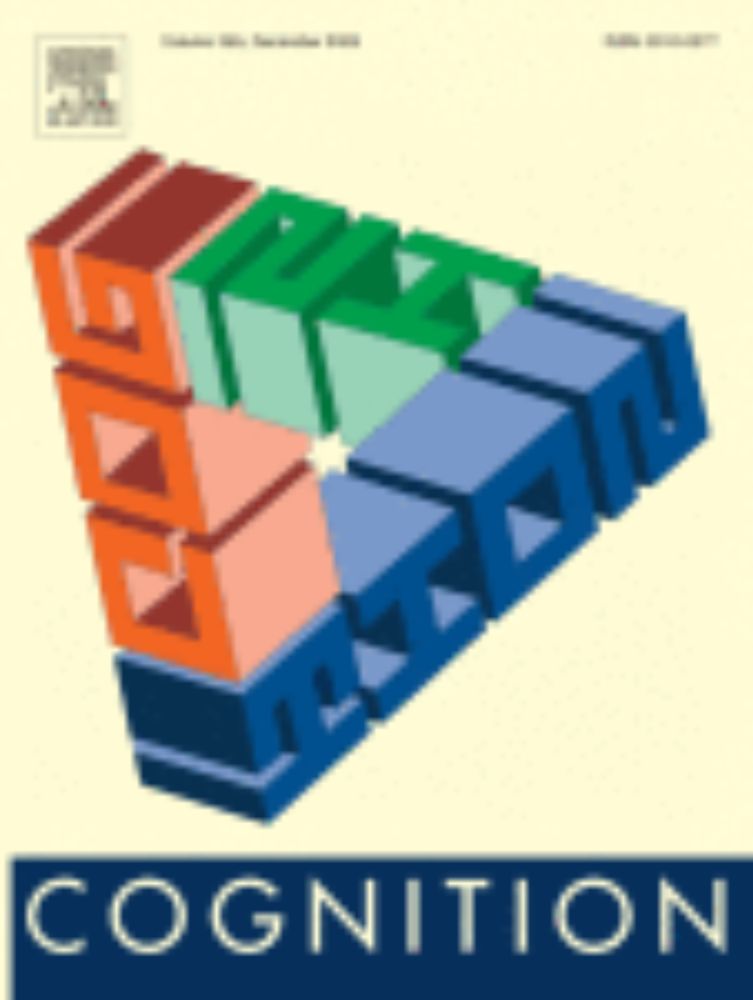
Planning to be incremental: Scene descriptions reveal meaningful clustering in language production
How do speakers plan complex descriptions and then execute those plans? In this work, we attempt to answer this question by asking subjects to describ…
www.sciencedirect.com
September 22, 2025 at 10:44 PM
New paper: We argue that linearization in language production is a foraging process, with speakers navigating semantic and spatial clusters. Lead author: Karina Tachihara, former UC Davis postdoc, now faculty at UIUC!
www.sciencedirect.com/science/arti...
www.sciencedirect.com/science/arti...
Reposted by Martin Zettersten
I’m hiring!! 🎉 Looking for a full-time Lab Manager to help launch the Minds, Experiences, and Language Lab at Stanford. We’ll use all-day language recording, eye tracking, & neuroimaging to study how kids & families navigate unequal structural constraints. Please share:
phxc1b.rfer.us/STANFORDWcqUYo
phxc1b.rfer.us/STANFORDWcqUYo

Research Coordinator, Minds, Experiences, and Language Lab in Graduate School of Education, Stanford, California, United States
The Stanford Graduate School of Education (GSE) seeks a full-time Research Coordinator (acting lab manager) to help launch and coordinate the Minds,.....
phxc1b.rfer.us
September 15, 2025 at 6:57 PM
I’m hiring!! 🎉 Looking for a full-time Lab Manager to help launch the Minds, Experiences, and Language Lab at Stanford. We’ll use all-day language recording, eye tracking, & neuroimaging to study how kids & families navigate unequal structural constraints. Please share:
phxc1b.rfer.us/STANFORDWcqUYo
phxc1b.rfer.us/STANFORDWcqUYo
Reposted by Martin Zettersten
The Item Response Warehouse is a new data resource for psychometricians interested in developing methods using bigger and more diverse sets of instruments: itemresponsewarehouse.org
New paper out now at BRM: doi.org/10.3758/s134...
New paper out now at BRM: doi.org/10.3758/s134...


September 8, 2025 at 3:28 AM
The Item Response Warehouse is a new data resource for psychometricians interested in developing methods using bigger and more diverse sets of instruments: itemresponsewarehouse.org
New paper out now at BRM: doi.org/10.3758/s134...
New paper out now at BRM: doi.org/10.3758/s134...
Reposted by Martin Zettersten
New Open dataset alert:
🧠 Introducing "Spacetop" – a massive multimodal fMRI dataset that bridges naturalistic and experimental neuroscience!
N = 101 x 6 hours each = 606 functional iso-hours combining movies, pain, faces, theory-of-mind and other cognitive tasks!
🧵below
🧠 Introducing "Spacetop" – a massive multimodal fMRI dataset that bridges naturalistic and experimental neuroscience!
N = 101 x 6 hours each = 606 functional iso-hours combining movies, pain, faces, theory-of-mind and other cognitive tasks!
🧵below

September 4, 2025 at 7:21 PM
New Open dataset alert:
🧠 Introducing "Spacetop" – a massive multimodal fMRI dataset that bridges naturalistic and experimental neuroscience!
N = 101 x 6 hours each = 606 functional iso-hours combining movies, pain, faces, theory-of-mind and other cognitive tasks!
🧵below
🧠 Introducing "Spacetop" – a massive multimodal fMRI dataset that bridges naturalistic and experimental neuroscience!
N = 101 x 6 hours each = 606 functional iso-hours combining movies, pain, faces, theory-of-mind and other cognitive tasks!
🧵below
Reposted by Martin Zettersten
Preschoolers Selectively Attend to Speech That They Can Learn More From by @ruthefoushee.bsky.social and colleagues
onlinelibrary.wiley.com/doi/10.1111/...
onlinelibrary.wiley.com/doi/10.1111/...

Preschoolers Selectively Attend to Speech That They Can Learn More From
We introduce a novel method to test a classic idea in developmental science that children's attention to a stimulus is driven by how much they can learn from it. Preschoolers (4–6 years, M=4.6${\it M...
onlinelibrary.wiley.com
August 20, 2025 at 1:18 PM
Preschoolers Selectively Attend to Speech That They Can Learn More From by @ruthefoushee.bsky.social and colleagues
onlinelibrary.wiley.com/doi/10.1111/...
onlinelibrary.wiley.com/doi/10.1111/...
Reposted by Martin Zettersten
I wrote an R package that creates standardized R project structures that are compliant with @mekline.bsky.social's psych-DS...ish.
It also creates additional features for reproducibility and teaching like a readme, license, .gitignore and Quarto templates
+ can validate existing projects
It also creates additional features for reproducibility and teaching like a readme, license, .gitignore and Quarto templates
+ can validate existing projects
Creating and validating standardized R project structures that are psych-DS compliant-ish
Making psychological code and data FAIR is hard, in part because different projects organize their code and data very differently.
Sometimes this is for good reasons, such as due to the demands of a g...
mmmdata.io
August 15, 2025 at 6:00 PM
I wrote an R package that creates standardized R project structures that are compliant with @mekline.bsky.social's psych-DS...ish.
It also creates additional features for reproducibility and teaching like a readme, license, .gitignore and Quarto templates
+ can validate existing projects
It also creates additional features for reproducibility and teaching like a readme, license, .gitignore and Quarto templates
+ can validate existing projects
Reposted by Martin Zettersten
My final project from grad school is out now in Dev Psych! Mombasa County preschoolers were more accurate on object-based than picture-based vocabulary assessments, whereas Bay Area preschoolers were equally accurate on object-based and picture-based assessments.
psycnet.apa.org/doiLanding?d...
psycnet.apa.org/doiLanding?d...
APA PsycNet
psycnet.apa.org
August 6, 2025 at 11:54 PM
My final project from grad school is out now in Dev Psych! Mombasa County preschoolers were more accurate on object-based than picture-based vocabulary assessments, whereas Bay Area preschoolers were equally accurate on object-based and picture-based assessments.
psycnet.apa.org/doiLanding?d...
psycnet.apa.org/doiLanding?d...
Reposted by Martin Zettersten
Happy to share "The Dynamics of Caregiver Unpredictability Shape Moment-to-Moment Infant Looking During Dyadic Interaction," out now in Child Development thanks to a large team of people I worked on this with! srcd.onlinelibrary.wiley.com/doi/pdfdirec...
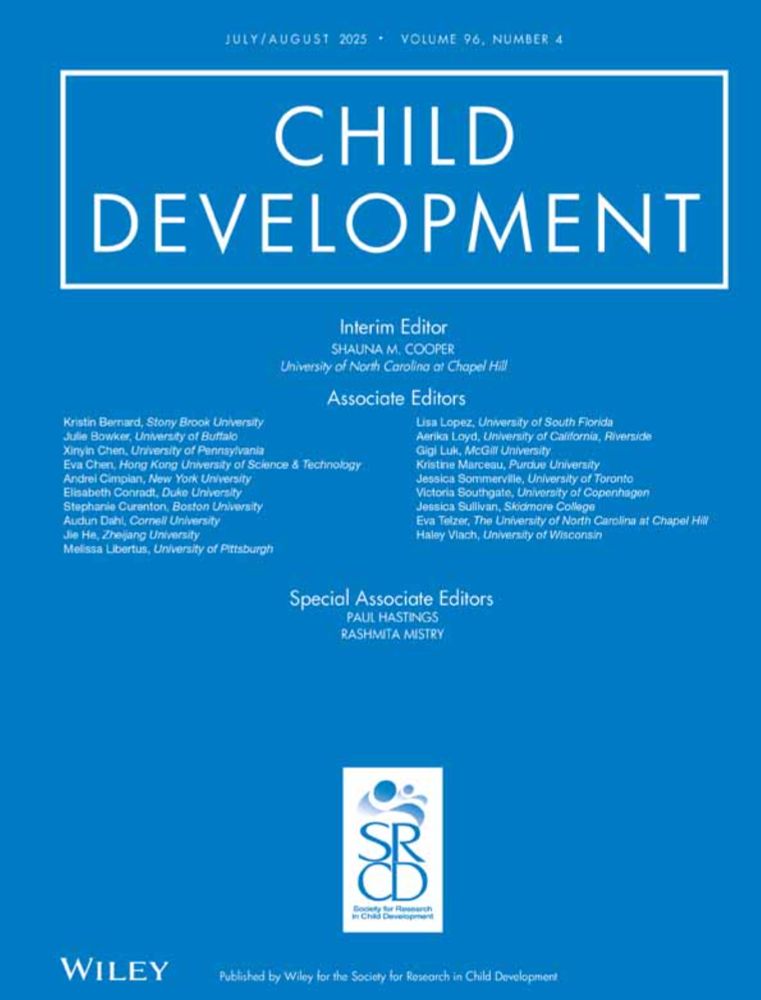
<em>Child Development</em> | SRCD Journal | Wiley Online Library
Cognitive development is associated with how predictable caregivers are, but the mechanisms driving this are unclear. One possibility is caregiver predictability initially shapes how infants gather i...
srcd.onlinelibrary.wiley.com
August 6, 2025 at 3:08 PM
Happy to share "The Dynamics of Caregiver Unpredictability Shape Moment-to-Moment Infant Looking During Dyadic Interaction," out now in Child Development thanks to a large team of people I worked on this with! srcd.onlinelibrary.wiley.com/doi/pdfdirec...
Reposted by Martin Zettersten
Job announcement 📢
@shawnrhoadsphd.bsky.social and I are looking for a joint postdoc interested in computational models of social interaction!
Interested? If you’ll be at #rlc2025 (or I missed you at #cogsci2025) feel free to reach out with any questions!
apply.interfolio.com/165809
@shawnrhoadsphd.bsky.social and I are looking for a joint postdoc interested in computational models of social interaction!
Interested? If you’ll be at #rlc2025 (or I missed you at #cogsci2025) feel free to reach out with any questions!
apply.interfolio.com/165809
August 4, 2025 at 5:35 PM
Job announcement 📢
@shawnrhoadsphd.bsky.social and I are looking for a joint postdoc interested in computational models of social interaction!
Interested? If you’ll be at #rlc2025 (or I missed you at #cogsci2025) feel free to reach out with any questions!
apply.interfolio.com/165809
@shawnrhoadsphd.bsky.social and I are looking for a joint postdoc interested in computational models of social interaction!
Interested? If you’ll be at #rlc2025 (or I missed you at #cogsci2025) feel free to reach out with any questions!
apply.interfolio.com/165809
Reposted by Martin Zettersten
Notes from @noranewcombe.bsky.social 's beautiful Rumelhart Prize "tasting menu" - congratulations Nora!!! #CogSci2025
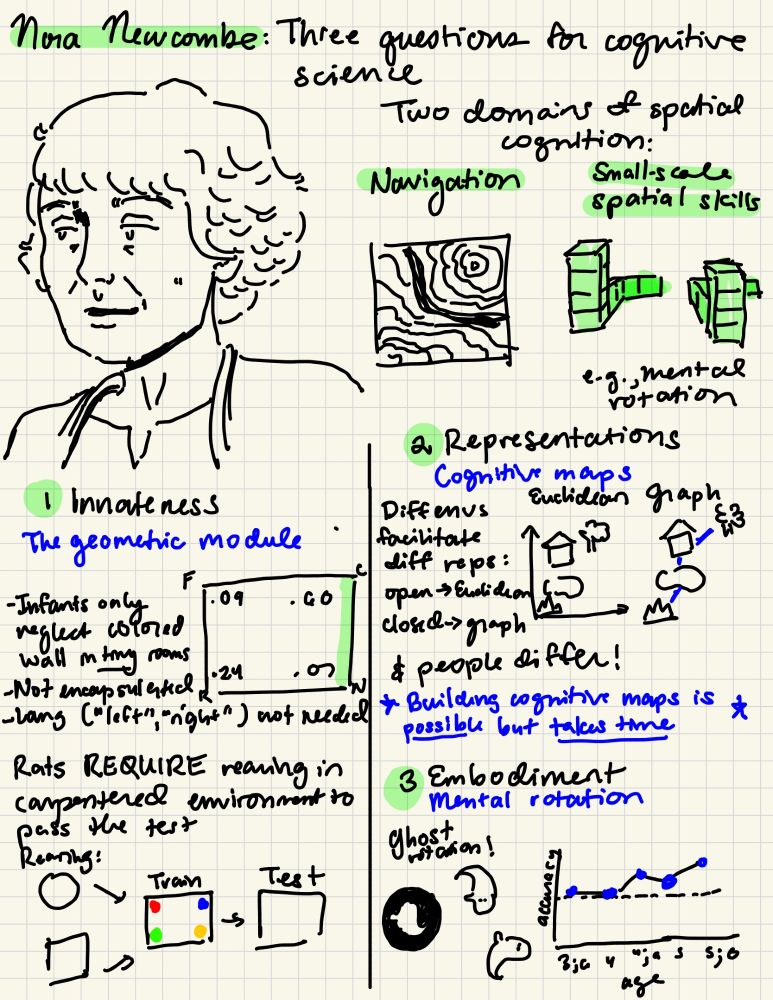
August 1, 2025 at 12:16 AM
Notes from @noranewcombe.bsky.social 's beautiful Rumelhart Prize "tasting menu" - congratulations Nora!!! #CogSci2025
Reposted by Martin Zettersten
Congrats to Doug Medin on becoming the next Rumelhart prize winner! 🏆 My “academic grandpa” through multiple pathways! #cogsci2025
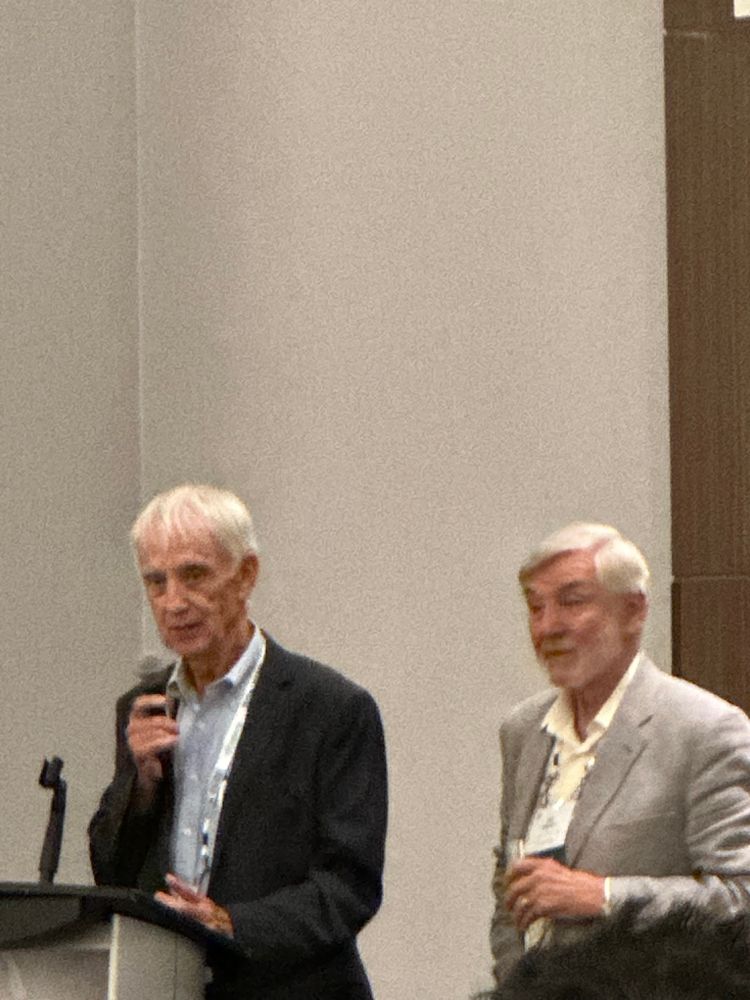
August 1, 2025 at 4:19 AM
Congrats to Doug Medin on becoming the next Rumelhart prize winner! 🏆 My “academic grandpa” through multiple pathways! #cogsci2025
Reposted by Martin Zettersten
I and my lab are happy to be at #cogsci2025! Here's a shortcut to find work from the fabulous folks in my lab (and me) 😄
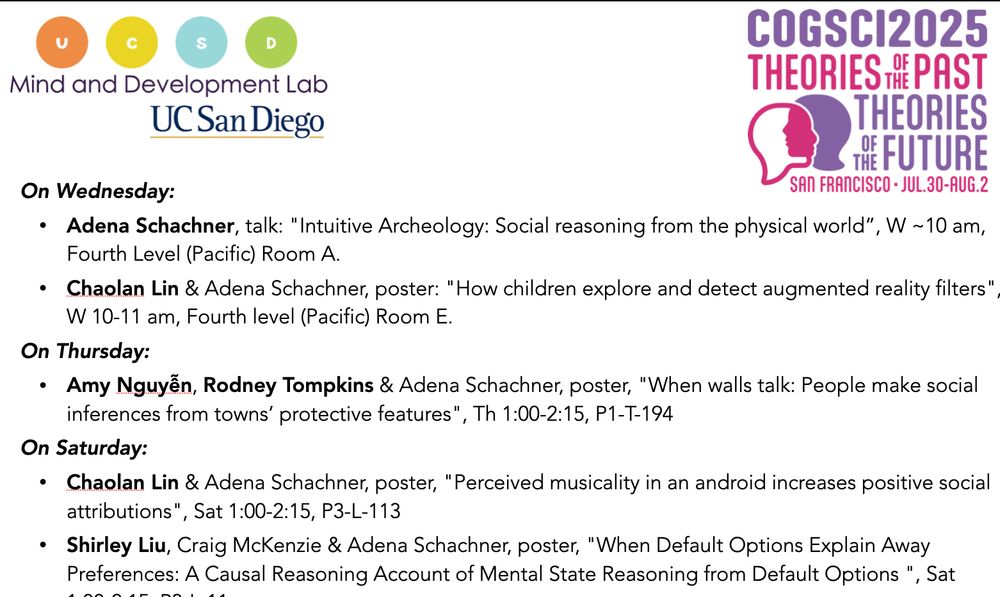
July 30, 2025 at 1:13 AM
I and my lab are happy to be at #cogsci2025! Here's a shortcut to find work from the fabulous folks in my lab (and me) 😄
Reposted by Martin Zettersten
🚨 Calling all dog behavior & cognition researchers - ManyDogs Project is launching ManyDogs 2!
🔍🐕🦺We're studying overimitation: Do dogs copy irrelevant actions just b/c their favorite human does them?
Email manydogsproject2@gmail.com to collaborate globally and contribute to reproducible science!
🔍🐕🦺We're studying overimitation: Do dogs copy irrelevant actions just b/c their favorite human does them?
Email manydogsproject2@gmail.com to collaborate globally and contribute to reproducible science!

July 22, 2025 at 2:19 AM
🚨 Calling all dog behavior & cognition researchers - ManyDogs Project is launching ManyDogs 2!
🔍🐕🦺We're studying overimitation: Do dogs copy irrelevant actions just b/c their favorite human does them?
Email manydogsproject2@gmail.com to collaborate globally and contribute to reproducible science!
🔍🐕🦺We're studying overimitation: Do dogs copy irrelevant actions just b/c their favorite human does them?
Email manydogsproject2@gmail.com to collaborate globally and contribute to reproducible science!
Reposted by Martin Zettersten
📣 I'm looking for a postdoc to join my lab at NYU! Come work with me on a principled, theory-driven approach to studying language, learning, and reasoning, in humans and AI agents.
Apply here: apply.interfolio.com/170656
And come chat with me at #CogSci2025 if interested!
Apply here: apply.interfolio.com/170656
And come chat with me at #CogSci2025 if interested!
July 21, 2025 at 10:28 PM
📣 I'm looking for a postdoc to join my lab at NYU! Come work with me on a principled, theory-driven approach to studying language, learning, and reasoning, in humans and AI agents.
Apply here: apply.interfolio.com/170656
And come chat with me at #CogSci2025 if interested!
Apply here: apply.interfolio.com/170656
And come chat with me at #CogSci2025 if interested!
Reposted by Martin Zettersten
My paper with @stellalourenco.bsky.social is now out in Science Advances!
We found that children have robust object recognition abilities that surpass many ANNs. Models only outperformed kids when their training far exceeded what a child could experience in their lifetime
doi.org/10.1126/scia...
We found that children have robust object recognition abilities that surpass many ANNs. Models only outperformed kids when their training far exceeded what a child could experience in their lifetime
doi.org/10.1126/scia...
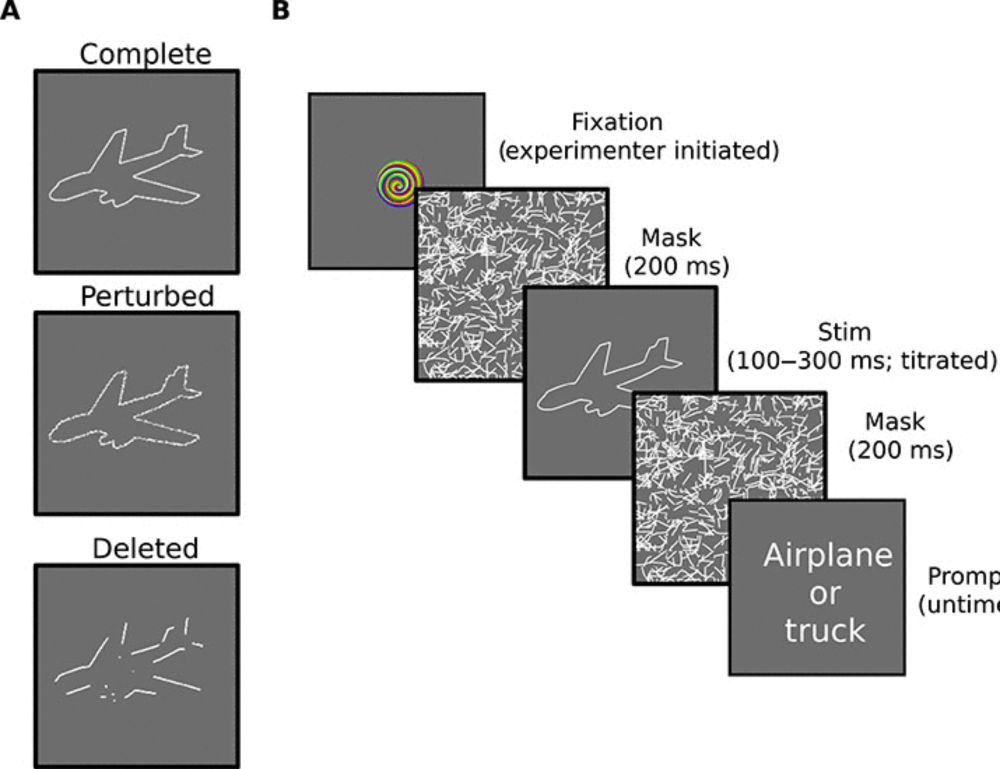
Fast and robust visual object recognition in young children
The visual recognition abilities of preschool children rival those of state-of-the-art artificial intelligence models.
doi.org
July 2, 2025 at 7:38 PM
My paper with @stellalourenco.bsky.social is now out in Science Advances!
We found that children have robust object recognition abilities that surpass many ANNs. Models only outperformed kids when their training far exceeded what a child could experience in their lifetime
doi.org/10.1126/scia...
We found that children have robust object recognition abilities that surpass many ANNs. Models only outperformed kids when their training far exceeded what a child could experience in their lifetime
doi.org/10.1126/scia...
Enjoyed this interesting discussion with Rhodri Cusack & co-author team about their foundation model perspective on infant development! Both the letter by @marielgoddu.bsky.social, Ruthe, and I (www.cell.com/trends/cogni... and a thoughtful response from the original authors are now officially out.
July 5, 2025 at 1:37 AM
Enjoyed this interesting discussion with Rhodri Cusack & co-author team about their foundation model perspective on infant development! Both the letter by @marielgoddu.bsky.social, Ruthe, and I (www.cell.com/trends/cogni... and a thoughtful response from the original authors are now officially out.
Reposted by Martin Zettersten
Experimentology is out today!!! A group of us wrote a free online textbook for experimental methods, available at experimentology.io - the idea was to integrate open science into all aspects of the experimental workflow from planning to design, analysis, and writing.
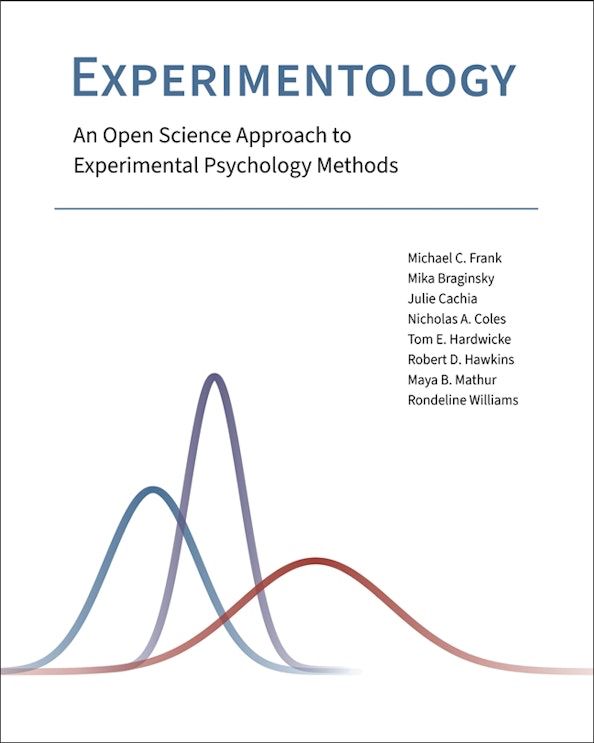
July 1, 2025 at 6:26 PM
Experimentology is out today!!! A group of us wrote a free online textbook for experimental methods, available at experimentology.io - the idea was to integrate open science into all aspects of the experimental workflow from planning to design, analysis, and writing.
Reposted by Martin Zettersten
Check out our new TICS paper on disagreement and metacognition! We argue that disagreement drives metacognitive development by expanding children's consideration sets.
With Antonia Langenhoff, Bill Thompson @wdt.bsky.social and Mahesh Srinivasan
www.sciencedirect.com/science/arti...
With Antonia Langenhoff, Bill Thompson @wdt.bsky.social and Mahesh Srinivasan
www.sciencedirect.com/science/arti...

Disagreement drives metacognitive development
Metacognition improves significantly over childhood, but the mechanisms underlying this development are poorly understood. We first review recent rese…
www.sciencedirect.com
June 19, 2025 at 10:13 AM
Check out our new TICS paper on disagreement and metacognition! We argue that disagreement drives metacognitive development by expanding children's consideration sets.
With Antonia Langenhoff, Bill Thompson @wdt.bsky.social and Mahesh Srinivasan
www.sciencedirect.com/science/arti...
With Antonia Langenhoff, Bill Thompson @wdt.bsky.social and Mahesh Srinivasan
www.sciencedirect.com/science/arti...

